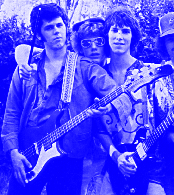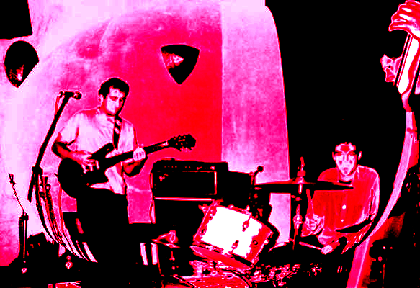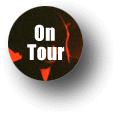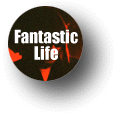|

Fantastic Life! is Squealer's printed catalog, and includes
reviews, interviews, musings and ruminations on all things Squealer.
This is the electronic archive.
The Eubankian Stomp: Chris Eubank, the Omnipresent Effervescent.
An interview with Spatula bassist/cellist Chris Eubank, who
is one of North Carolina's most active and unsung musicians.
by Butch Lazorchak
|

|
Chris Eubank has been an underrated
presence on the North Carolina music scene for more than a
decade. While classically trained and blessed with good
bloodlines (his father is a music professor, and his mother
taught piano lessons on the side), Eubank has spent most of
his time playing in rock bands. Since moving up from
Orlando, Fla. to Durham to attend Duke in 1982, Eubank has
made his presence felt by playing in a dizzying array of
bands, including the Ugly Americans, Blue Chair,
Skeletal Remains, the Mind Sirens, Bicentennial Quarters,
Polycarp, Repetophile and Shark
Quest. His active status as the cellist/bassist in
Spatula keeps us keenly interested in his
well-being, but as you'll see, his membership in that band
is just one aspect of his character.
|
C: Chris Eubank
B: Butch Lazorchak
B: You had said that when you were living in Orlando that you used
to listen to the Rollins College radio station.
C: They were pretty good, actually. I haven't kept up with them,
obviously. When I was in high school, which was 79, 80, 81...at
night, they played punk rock stuff. So I got to hear the Sex Pistols,
Black Flag, Flipper, Human League...stuff like that.
B: Punk rock stuff like the Human League!
C: Well, you know, it wasn't all categorized at that point. People
would play Soft Cell and Flipper and stuff like that without feeling
that they were incompatible.
B: It was all part of the `underground'.
C: Right. And so, it was pretty good. And you could actually buy
stuff like that in the equivalent of places like Peaches. There's was
actually a copy of the PIL Metal Box there at the store. I didn't buy
it. It just seemed like stuff like that would always be
available.....
B: So, you were in high school there, and I guess you were taking
music lessons...
C: I took a little bit of piano when I was young...maybe 6 or
something like that, but I didn't really cotton to it.
B: Were your parents musical?
C: Oh yeah! That's what my father does: he's a music professor.
And my mother also teaches piano privately. So, I was around a
lot of music. I started playing the cello when I was in fifth
grade, around age 11 or so. And I've been playing ever since.
[Discussion of the degree of underground musical activity in the
1980's...]
C: Yeah, there was a lot of stuff going on. I didn't really get
involved in it too much in `82 because I wasn't aware of its
existence. You know, I'd heard underground stuff on the radio, but I
wasn't aware that it was something that I could be involved in. I was
still playing what I guess you'd call `classic rock' at this point.
When you were playing the Stones in 1981, it wasn't `classic rock',
it was just stuff that people liked to hear at parties. I gradually
started to meet some people who were doing stuff around and got
involved in some stuff myself.
B: When you go to school it takes some time to orient
yourself...
C: Well, at Duke, possibly more than at some other schools, cause
Duke is somewhat isolated from the community.
B: How so?
C: A lot of students are not from the area, so as you make friends
they're not people that are going to say `let me show you this area
that I'm familiar with.' You're meeting other people who are also
strangers-transplants.
B: Well, how did you start meeting people in that area?
C: I met some folks who worked at records stores....who were at
shows....stuff like that.
B: You're playing the cello, and that's not exactly a rock 'n'
roll instrument....
C: Well, I also played bass. I started playing bass guitar when I was
in high school cause I was interested in playing rock music.
B: I'm trying to figure out how you started to get integrated with
what was going on a little more specifically...
C: There's a bunch of little things that you could point at....there
was a radio station at Duke at the time. It was not WXDU when I was
there at first. It was an AM station WDUK, but I knew some people who
were DJ's there, and so that plays a role. And I became a DJ there
when WXDU started in `83. I was exposed to some stuff that was going
on through that means. I met some folks and started a group with them
in `83, and so got a chance to go see some shows and be a part of
some shows then and in `84.
B: What band was that?
C: That was the Ugly Americans [Danny Hooley - guitar; Simon Bob
Sinister - vox and guitar; Dan Adams, Jon McClain, Dave Riegel -
drums; Chris Eubank - bass; some other folks for short periods of
time-ed]. I had already played some with the first drummer for that
group in my freshman year, and then we met the other two guys in the
band (one of them worked in a record store in Durham) and then met
the other guy through him.
B: Did those guys go to Duke?
C: No. The drummer did, but the singer and the guitar player didn't.
B: Just hanging out in Durham?
C: Well, they lived in Durham. Danny, the guitar player, was from
Rockland County in the New York area, but he had been in Durham for a
while. I'm not exactly sure when Simon Bob got to Durham, but it was
a couple of years before I did.
B: But he came from someplace else?
C: Yeah. He was in Green Bay for a little bit, and I think he was in
Texas and California.
B: What record store was he working at?
C: Simon Bob was working at the Record Bar in Northgate Mall. It's
now a Tracks or something like that. They had a good punk rock
section, cause he could buy records for the store.
B: My impression is that the punk rock scene down in your area was
pretty strong. You hear a lot about D.C. or Los Angeles, but there
was also a lot of stuff going on down there...
C: Yeah, well I think that there was a lot of stuff going on all over
the place, and perhaps the stuff in the big cities just got better
documented. There were a lot of people who were doing a lot of things
in the Triangle area. There were certainly a lot of bands, and people
who put on shows and who put out zines and stuff like that. I don't
know if it was an unusually large amount. It didn't seem that way, I
guess because it seemed like there were people everywhere doing it.
It was exciting, yeah.
B: The Ugly Americans got big enough to get signed to Enigma.
C: We weren't really on Enigma. We were on Death Records, which was
part of Metal Blade, which was distributed by Enigma.
B: How did that all come about?
C: Well, the singer for our group, Simon Bob, was touring with
Corrosion of Conformity. [C.O.C. was probably the most well-known of
all the North Carolina punk bands of the period. They've recorded
almost 10 records for a variety of labels, and are still active
today.-ed.] I guess it was in 1984. I guess as a guitar tech, or
helper or whatever. I guess they already had a deal with Death
Records, and they recorded their second record at Death's studio out
in Hollywood, Calif. I guess Simon Bob had a chance to talk with the
folks out there and give them a demo tape of one of our first
records. So, they were interested in having us do a record for them.
Good old-fashioned networking.
B: So, you did do a record for them.
C: We did a record for them, which was really just a 12" EP [Who's
been sleeping in my bed?], and then a 7" single ["Philadelphia
Freedom" b/w "Backlash/Sleepless Nightmare"].
B: How was that experience?
C: It was good. I mean, it was nice to not have to pay to put out
your own record. That much hasn't changed even to this day!
B: I guess I'm just trying to get an idea of the size of the
scene, or how successful you guys were. Did having a record like
this, which was fairly high profile nationally...were you able to
tour nationally?
C: Well, yeah, we toured nationally, I guess twice. To the extent
that we went all the way out to the West Coast. I guess makes it a
national tour. But, we could have done that without the second
record, I think, because of the fact that there was a support network
for that kind of thing then. If it was a punk rock group-if it was
active politically, or playing one of the styles within the broad
range of stuff that was considered to be punk at the time, which was
really pretty inclusive-then there were a lot of people who would
help out, in terms of setting up shows, putting the band up; folks
who did zines and would write about the groups and do interviews and
stuff like that. It didn't seem to be terribly hard to book tours at
the time. Cause, you know they weren't all at night clubs. They were
wherever. People who rent halls, or there would be shows at people's
houses...stuff like that. I guess that that still goes on today, but
it doesn't seem quite as much.
B: Seems that within the `punk-rock scene' that same kind of
network still exists...
C: Yeah, it does. And to a certain extent, I'm older and not playing
that kind of music anymore, so I wouldn't be in a good position to
really compare to what extent things are different today from when I
was really doing that more. Certainly, for me, I don't do it as much,
although, not necessarily cause I don't enjoy it. I actually like
playing shows at people's houses.
B: So you toured, and you put out records, and then you decided not to play
with each other anymore....
C: Yeah, and that happens. It was `86, and it just really seemed
like things were not progressing anymore. So we decided to call
it quits. Simon Bob went on to sing for Corrosion of Conformity
for a couple of years. And we all went our separate ways, more
or less.
B: Had you started playing with other people while you were
playing with the Ugly Americans?
C: I don't think, at the time, that I was playing with any other
groups. I think it was just one. Then after that it was just one, and
I think it was a few years before I started playing with more than
one group at a time.
B: Was it Blue Chair right after that?
C: No, it was Foreign Bodies actually.
B: Tell me about Foreign Bodies.
C: Foreign Bodies was a group that already existed prior to the
breakup of the Ugly Americans. I met the drummer for FB at a party in
early summer of `86. He knew I played bass in the Ugly Americans, and
was interested in having me play bass with their group. So, I joined
the group, and played together for a few months, and then that wasn't
working out either, and the group broke up. But once again, that
happens. But the drummer for that group and I have continued to play
together on and off for many years.
B: Who was the drummer?
C: The drummer was Ian Davis. [As we shall see later, Ian Davis
played drums for the band Mind Sirens circa their Squealer/Jettison
album, and later helped found the Bicentennial Quarters with Eubank
and Walker Martin. Before moving to San Francisco, he was a regular
presence on the Triangle-area improvisational music scene. We're
getting a little ahead of ourselves, however.-ed] That's how it
is: some folks come through and you play together and assuming
that things work out, even if the group doesn't work out, things
can persist in some sort of form.
B: After Foreign Bodies, then it was......Skeletal Remains? Blue
Chair?
C: I played with Blue Chair before I played with Skeletal Remains,
which was really called Skeleton Crew Jr. through its existence
[Skeletal Remains released a 10" record on Jettison in 1991.-ed]. We
really only called the record Skeletal Remains, and sort of
retroactively named the band that. And that record was really sort of
a posthumous record. That was a little later. And then there was an
Ugly Americans reunion that was happening during that period too, so
I guess that was really when things got underway in terms of lots of
bands at the same time.
B: So this was about 1987 sometime?
C: No, this was later. This was like `89 or `90.
B: So you've got the sort of dark years...
C: You mean in-between? No, Blue Chair was going probably in `88...
B: Where does Todd Goss come in to play?
C: Well, Todd is another person that has been around here for a long
time. His parents live in Durham; he grew up here. I met him at a
record store, interestingly enough. He was working there at the time.
You know, I'm having trouble remembering which one it was, but it was
at North Duke Mall. It doesn't exist anymore. I met him, and you
know, this is not so big a town that after you meet somebody you
don't ever see them again.
B: You probably saw him all the time, at all those Black Flag
shows that he went to...
C: Yeah, he was going to shows, and I was going to shows so we knew
each other. Around the time that Blue Chair was starting to think
that it would be a good idea to put out a 7" single, we found out
that Todd was interested in starting a record label [the record label
was Jettison Records, which still exists to a certain extent.
Jettison put out records from Picasso Trigger, Minerva Strain, Mind
Sirens, Crowsdell, Finger, Antiseen, Bicycle Face, Shiny Beast and a
whole bunch more. Several of these bands have also recorded for
Squealer. The Blue Chair 7", Where I Hunt My Enemy", was Jettison
Records 001.-ed] So, it worked out pretty well, I guess, for both of
us, except that the record didn't really sell very many copies.....
B: So it worked out better for you guys than it worked out for
him, really...
C: He obviously had fun doing it, to a certain extent, and things
didn't work out terribly...
B: Who all was in Blue Chair?
C: The guitarists' name was Trent Hill. He was student [at Duke],
also. Then, we went through a couple of drummers. The two that we
used for a while were Ken Altman, who was also a student, and Ian
Davis, who we mentioned before.
B: Did Blue Chair travel much?
C: No, not too much. At this point we're into the sort of `modern
age', where shows are more `indie rock' focused, you know trying
to persuade nightclubs to book shows, rather than sort of DIY
[Blue Chair ran from `88-'90, then from `91-'93. They opened Triangle-area
shows for Thin White Rope and Beat Happening amongst others.-ed]
B: So, you're playing in Blue Chair, I guess that at that point
you'd been playing around so much that you were fairly well-known.
Like you were saying, whenever anybody needed a cello player....Were
you playing cello in any bands at this time?
C: Well, in Skeleton Crew Jr. I didn't play cello for a while, and
then I started playing it again with them.
B: Did you guys play out fairly often? I could never figure what
[Skeletal Remains] was exactly?
C: When that band existed? I'm not sure of the exact dates, but it
was in the range of, probably, `89 to `91, although they existed
before I joined the group. They already had things going as a trio.
B: Did you play in the Anubis Leisure Society?
C: I played in real late-stage Anubis. That group had been going for
a while at the same time as Blue Chair. Actually, at the same time as
Foreign Bodies, because we'd have Foreign Bodies' practice over at
Ian Davis' house, and then they would also have Anubis Leisure
Society practice. Occasionally it'd be double-headers for Ian. So
that group existed for a while in the `80's, then stopped existing,
then got back together again around the same time as the CD that came
out on Jettison [the Anubis Leisure Society Orchestra CD, JET 007
from 1991. Eubank is listed on the back as `executive producer',
though he does not play on the album.-ed], which was stuff culled
from recording sessions from that first incarnation. They got back
together and played, and towards the end of that second period of
existence, I did some shows with them.
B: So when that CD came out, they'd already had a break and come
back together.
C: Right. There's probably some sequence there that's not exactly
right. I was not totally affiliated with the group so I can't say,
but that's approximately about the time they got back together.
B: What about your affiliation with the Wifflefist Collective? [A
record label and arts collective based in Raleigh, who did a number
of very interesting things in the mid-90's. While still in existence,
their musical peak was probably the Scattered and Smothered
compilation from 1995, which featured two Eubank bands, Bicentennial
Quarters and Polycarp, as well as music from Krapper Keeper, Silica
Gel, Mag Wheels and others. Rich Misenheimer of Polycarp remixed a
version of the song `Lasko' (under the name Friend Side Monkey) on
Spatula's Despina By Land album.-ed].
C: Ah, the Wifflefist Collective! That was just another thing that
seemed like a good thing to do. I knew the guys who founded the
Collective; one of them dated a housemate of mine. That was back in
`87, or something like that, so I'd know them for a while. A couple
of them were students at the Design School at N.C. State, and were
used to doing sort of big theme projects, if you will. You know,
theme parties and installations and stuff like that. Basically, the
whole point of that thing was that a lot of the folks would get
started on projects and never finish them. Not sort of unusual. And
if there were other folks involved, who had musical equipment or
similar interests or stuff like that that the people could lean on
the other guys to finish what they were working on. Sort of a real
collective, I guess. Like, `hey, I heard you were working on this
tape or video or whatever. You didn't finish it. I'm coming over
tomorrow and we're going to finish it.'
B: So you guys really pushed each other to do a lot of stuff?
C: Yes. There were bands associated with the label. There were other
outgrowths that were less music related. I guess Skip's film stuff
that he's doing now is a prime example of that [Skip Elsheimer has
been one of the most active participants in the Wifflefist
Collective. The `film stuff' referred to may be the performance group
`the AV Geeks', who put on performances featuring Elsheimer's huge
collection of training films.-ed].
[We digress into a discussion of a Wifflefist Collective Xmas
radio broadcast on WKNC in Raleigh from several years ago...]
C: That was Repetophile. Basically, that was the most loosely
organized of any of the things. Basically, it involved anybody who
wanted to come make noise. If you had tape loops already, you could
come with a turntable and some records and loop them. Essentially, do
anything. There were some people who had set pieces for that one. The
guys in Silica Gel [another Wifflefist band which released the
excellent 50) Noisy Children Party album in 1993.-ed] had a couple of
things that were more planned out that happened during that. That one
was really sort of free. No definite membership. Yeah, Repetophile
also opened for Fear. That was fun!
B: That's good to hear, actually. As an outsider to the Triangle,
I get the impression that there's a bit more cross-pollination of
styles, and that the people, or the club owners, or whoever, is a bit
more open to a mixture of styles of music within the underground
banner.
C: I think it's because club-goers are willing to except that.
There's this history of this area being willing to accept that sort
of thing. I guess that we owe lots to the groups that came before us,
even. There was original music being produced here as far back as the
70's, possibly earlier than that, but the 70's was the time that was
recent enough when I came here that I could be aware of it. You know,
bands like th' Cigaretz and Arrogance, and the Nee-Ningy Band and so
on. They were just doing `stuff', and it was their own music, and
people had come to expect that and value that.
B: Now the variety seems pretty incredible. I guess it reflects
the variety of stuff that's available in general. I just get the
feeling that down there, there's a more nurturing environment for
people to really try to do something unique.
C: Well, there's a lot of college folks around here, and a lot of
folks who I think are just open to new experiences. They may already
be fairly cosmopolitan cause they moved here from a big city, or
California or something like that. This is a rapidly growing area.
B: So, the Wifflefist thing is going on, but what more formal band
were you playing in post-Skeletal Remains or Blue Chair.?
C: The stuff all was really sort of blending together. I was also
playing with the Mind Sirens [who released the album Decatur Cherry
Smash as a co-release between Squealer and Jettison in 1994. Eubank
does not play on the album, but Ian Davis does.-ed.] at that time. I
guess exact time lines are a little hazy, even though it's not that
long ago. Blue Chair stopped playing together, and the Anubis project
faded away, around the same time as the band that became the
Bicentennial Quarters started forming. I guess Polycarp also already
existed before I started playing with them. But, they and I knew each
other already so I started playing with them.
B: You say the band that `became' Bicentennial Quarters...
C: We weren't called that for the first year or two or something like
that. We had some other names....
B: But it was you and Ian and Walker Martin?
C: That's correct.
B: How did you meet Walker?
C: He was playing with the Anubis Leisure Society.
B: Why didn't you guys continue to call yourselves the Anubis
Leisure Society? I guess it's like Led Zeppelin and the New
Yardbirds...
C: Well, it wasn't the same kind of thing. It wasn't an improv
outfit.
B: You didn't consider Bicentennial Quarters an improv outfit
where Anubis Leisure Society was?
C: No, certainly not in the same kind of way. I mean, it was pretty
different. Not disparaging the Anubis stuff; a lot of that stuff was
pretty good. Not because of my contributions, of course-it was plenty
good without me. And probably worse when I was with the group. But it
was just different. It was a different approach. The stuff was
written out ahead of time and stuff like that.
B: Now, Randy Pelosi was the guitar player guy in the Anubis
Leisure Society, right?
C: Well, he plays different instruments. He plays saxophone and
guitar and Chapman Stick. I don't think of him as being just a guitar
guy.
B: But you've played with him quite a bit, or on and off?
C: On and off. Even when I'm playing with him, it's not a very
high-intensity, in terms of large numbers of practices a week
or something like that. It's informal.

B: How did you get hooked up with the Spatula guys [Squealer
recording artists, with Chuck Johnson on guitar and vocals and Matt
Gocke on drums. Their debut recording, a split 7" with Evil Weiner,
came with an early issue of Stay Free magazine in 1993. The band
operated as a duo for several years before Eubank joined. Matt and
Chuck had attended the same high school in Raleigh before attending
UNC-Chapel Hill.-ed.]?
C: That's a good question. I probably need to ask them that some day.
I don't really know, actually....
B: I mean, they had to come and ask you or something....
C: They asked me if I would play some cello on what became the second
record [Medium Planers and Matchers, released on Jesus Christ in
1995] that they did. So I played cello on some of the stuff, and it
just continued.
B: So it started...I guess they were recording that record?
C: It was before they were recording it. It was a couple of months
before they were planning to go to the studio. I got a tape of
the stuff, and went to some practices. I think we did a couple
of shows before the recording, though I'm not positive about that.
B: So, it really just started being sort of casual. It was one of
those things like, `are we still going out'?
C: Yeah, it was like that.
B: Next thing you know and you're married.
C: It's worked out really well. They're fun guys to play with.
B: Back to Bicentennial Quarters again. Bicentennial Quarters is
still active, and you're going on seven years...
C: That's probably about right. Six or seven, something like that.
We've been together for a while. Played for the first X number of
years with the original lineup of Walker, Ian and me. Then Ian moved
away and we've continued to play with Shannon [Morrow, originally
from the band Special Agents of Her Majesty's Secret Cervix, who
released a split 10" on Squealer, and a 7" record on Jettison.-ed],
and we have, I guess, some sort of unreleased CD at this point.
B: What's the plan with that? Is Walker still trying to find
somebody to put it out?
C: Yeah. I guess the hope would be that it wouldn't be unreleased.
That someone would put it out. I think that we were hoping to have it
be some big famous record label, and there has not been (to my
knowledge) an overwhelming interest in that, on the part of the big,
famous record labels. So, I don't know...
B: So that's where the little, not-so-famous record labels come
into play.
C: Uh, yeah.
[A digression into how great improvisational drummer Susie Ibarra
is, and how much Shannon likes her...]
B: So, around the time you're playing with Spatula that's when my
knowledge of your variety of things going on really came to fruition.
You played on the Barry Black record, the thing that Eric Bachman
[guitarist/vocalist of the Archers of Loaf] did...
C: Yeah. Well, time-wise, I'm not sure what came first. Yeah, I
played some stuff on that first Barry Black record, and right around
the same time I played something on the first Ben Folds record. Caleb
was recording both of them right around the same time. Caleb
Southern, for members of your audience who aren't familiar with Caleb
already.
B: The legendary Caleb Southern... [Caleb recorded a large
percentage of Triangle-area bands during the early and mid-90's. His
Kraptone Studios, often operating in the Cat's Cradle club during the
day, recorded almost all of the Jettison bands, and dozens of others.
To give you a quick example of his reach, he engineered the first
`modern-era' Southern Culture on the Skids album, Too Much Pork For
Just One Fork (released on Moist in 1991), as well as Polvo's first
record, the double 7" from early 1991 (later reissued on CD on Jesus
Christ). Between him and Jerry Kee, they accounted for a large
majority of all the Triangle bands recorded during this
period.-ed].
C: Caleb Southern is a legend around here, and, I guess, fast
becoming a legend to everybody. I've got nothing but good things to
say about him. I've been involved in a lot of things that he
recorded...
B: He was the guy who was doing all the recording of all the
bands!
C: Yeah. I mean, he worked hard around here for years...
B: And he was also doing sound at the Cat's Cradle and
stuff...
C: Doing sound at the Cradle. Putting in long, low-paid thankless
hours...and all the records were good, don't get me wrong. But he
finally did one that happened to be a big seller, and now is much in
demand. I have to hand it to Ben Folds: he's stuck with Caleb and is
continuing to promote him when he could have gone with some other
producers at this point. Hats off to Caleb, though he's so expensive
now that I'll probably never work with him again!
B: So he did all the Ben Folds records?
C: Yeah. He did the first two, and he did Fear of Pop, the new Ben
thing. And I believe, though I'm not sure, that he's working on this
one. This next one.
B: I had talked to him at one point and he was in `retirement',
and I guess he had gone back to school...
C: He decided not to do recording and soundman stuff any more. He was
going back to school to get involved with computer programming. He
actually finished the program, and then changed his mind.
B: And the world is a better place for that....
C: I think...he certainly loves to do this stuff and he's
exceptionally good at it. If he can make a bunch of money then more
power to him. I have nothing but good wishes for him.
B: Do you have some surprises? Some things that I don't know
about? Some things that you've played on, or people that you've
played with around this time...that John Zorn/Eugene Chadbourne
session?
C: I haven't played with John Zorn. I did play a show with Eugene
Chadbourne at the Cradle. It was fun. A guided improv thing that he
wrote called `The Insect and Western Show'.
B: The CD is out on Leo, I guess.
C: Oh, there's a CD of it? I wonder if I'm on it....He's done a lot
of performances of this with different lineups, although there's an
oboist in town named Carrie Shull...
B: Andy's sister... [Andy Shull, of the band Minerva Strain, who
co-released a split 10" on Squealer with H.M.S. Cervix.-ed].
C: It's a little strange to refer to someone only in relation to
someone else. I think that Carrie's an excellent player in her own
right. Through knowing her I got to play on that Eugene Chadbourne
show.
B: Now Shark Quest, which is like a supergroup... [Shark Quest
records for Merge, and their debut album, Battle of the Loons, came
out on Merge in 1998. Shark Quest comprises Groves Willer and Scott
Goolsby, both formerly of the Family Dollar Pharoahs; Laird Dixon,
formerly of Zen Frisbee; Sarah Bell, formerly of Dish; and Eubank.
Coincidentally, Battle of the Loons was recorded by Caleb
Southern.-ed]
C: I guess for a band to be a `supergroup', then people have to have
heard of the `groups'.
B: But within the Triangle-area rock scene, it is kind of a
supergroup....
C: Even within the Triangle-area, maybe in an extremely small segment
of that population, there are some people who heard of the groups
that people in Shark Quest used to play in.
B: The old-timers...
C: The people who liked indie rock knew about the groups, but that's
it. None of these groups that we're talking about that I was in were
famous. And, without wanting to seem disparaging, most of the groups
that the other people were in were not famous either. And there's
nothing wrong with that. I'd say that probably the most famous of all
of them would be Dish, which Sara Bell was in. Even Dish, although
they were successful and toured and had a major label record....
B: They played at the show at the Arctic Circle with Hole and Metallica....
C: Did they play at that? I'll have to ask her about that. But
even then, they're not really a household name. So I guess I'd
have to feel that there was a certain amount of irony involved
in calling Shark Quest a supergroup.
B: Shark Quest has done a couple, or one, or maybe 1/2 of a
tour...
C: We went on a two-week trip with Superchunk. Which was great. It
was a lot of fun. But compared with real working groups, that's
nothing. That's a longer trip than any of the groups that I play with
have been on since I've been with them. I think that Spatula may have
gone on a longer trip than that before I joined the group. To the
extent that two weeks is `long', you can see how much all these
groups are pretty much dabblers. You compare that with a band like
Southern Culture on the Skids, that probably plays 200+ shows a year,
and you can see there's the difference between the men and the boys,
so to speak.
B: But it's more a question of the opportunities that are available. When you're
Southern Culture playing the kind of music that they play, you've
got plenty of opportunities...
C: That's true, but they work harder at it too. I don't think
that everything has fallen into their lap, they've worked hard
to get where they are.
B: Besides rocking out (which you seem to do pretty much 24-7) I'm
sure that you've got room for other hobbies, fascinations and
obsessions.....
C: Well there's not much really. I try to read some books in my spare
time, and I like to go see music performed and stuff like that. I
guess I don't really have any other hobbies. I've been an aficionado
of computer games to a certain extent, but haven't really gotten into
playing on-line, and that's probably a good thing.
[Conversation really digresses into a discussion of the relative
merits of the Carmine Appice movie Black Roses...]
END
Home
|










